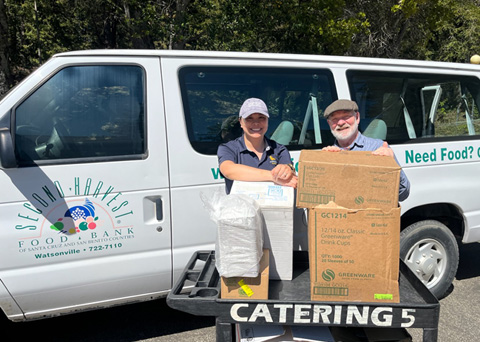Climate change has contributed to one of the rainiest California central coast winters on record in decades. In addition to numerous impacts across Santa Cruz county, the Pajaro River levee breached on March 11, flooding the unincorporated town of Pajaro in Monterey County just across the river from Watsonville, a primarily Spanish-speaking, agricultural and immigrant community with limited access to resources.
Within days of the breach, community based organizations across Santa Cruz and Monterey Counties worked swiftly with local groups and individuals to collect donations and volunteers. The UCSC Chancellor’s Office sent a campus message to support our neighbors in need. Second Harvest Food Bank of Santa Cruz County began serving food to hundreds of evacuees who did not have access to meal services.
When Second Harvest asked UCSC Dining & Catering Services for assistance, they quickly stepped up to the plate to offer resources. Catering donated several cases of to-go boxes and fresh produce to directly serve Pajaro evacuees.
“UCSC Dining & Catering Services values being a part of the Santa Cruz County community,” said Traci Takeuchi, Catering Services manager. “What happened to individuals in Pajaro is tragic. Being able to partner with an organization like Second Harvest, and support those in a time of need, is a privilege. We are a small community with only a few degrees of separation. While we don't personally know those impacted, it might as well have been any of our staff, family, and friends trying to get back on their feet. I have always believed that you should give with open arms. When you think you have nothing to give to someone, it may be better than you dare to think."
organization like Second Harvest, and support those in a time of need, is a privilege. We are a small community with only a few degrees of separation. While we don't personally know those impacted, it might as well have been any of our staff, family, and friends trying to get back on their feet. I have always believed that you should give with open arms. When you think you have nothing to give to someone, it may be better than you dare to think."
According to an Environmental Protection Agency 2021 press release promoting a report examining the impacts of climate change on socially vulnerable populations in the US, “the most severe harms from climate change fall disproportionately upon underserved communities [especially racial and ethnic minority communities], who are least able to prepare for, and recover from, heat waves, poor air quality, flooding and other impacts.”
Increased flooding frequency in Pajaro Valley has not escaped the attention of Regeneracion and the UCSC Sustainability Office. In Fall 2022, the two organizations teamed up and were awarded a two-year Transformative Climate Community (TCC) Planning Grant from the California Strategic Growth Council to identify community-driven projects that support and develop climate resiliency in Pajaro Valley and downtown Watsonville. Grant work is set to begin in May 2023.
“TCC grants allow and encourage frontline communities to leverage their collective lived experience to drive climate adaptation and resilience in their own neighborhoods. We look forward to learning what that means for our region and building equity-centered solutions in our community, ” said ileana Ortega Brunetti, UCSC’s sustainability and equity special projects manager.
The community dialogue process will be facilitated by UCSC staff and guided by the principles shared in the Community-Academic Partnerships to Advance Equity-Focused Climate Action (CAPECA) training program.
Last week, Pajaro evacuees started returning to their homes for cleanup, and are still in urgent need of assistance. On April 4, President Biden signed a Major Disaster Declaration and federal assistance is coming soon to the Pajaro Valley area.
If you are interested in assisting with efforts personally or through your department at UCSC, the Santa Cruz Volunteer Center provides many opportunities to contribute and regularly updates their website based on the most urgent needs.
If you have a UCSC team of faculty, staff or students who are already stepping up to assist with the environmental disaster in Pajaro, please consider connecting with the Sustainability Office at susted@ucsc.edu so that we can highlight your team’s story.
